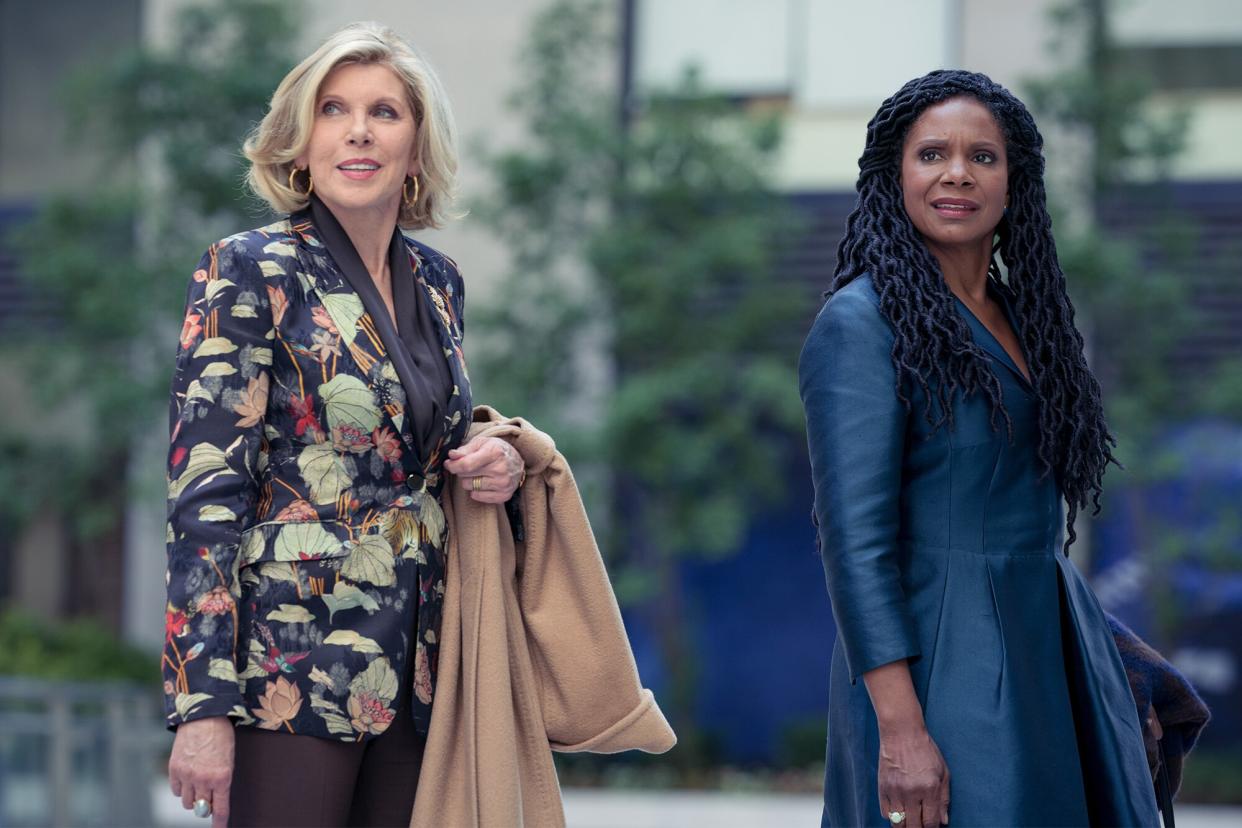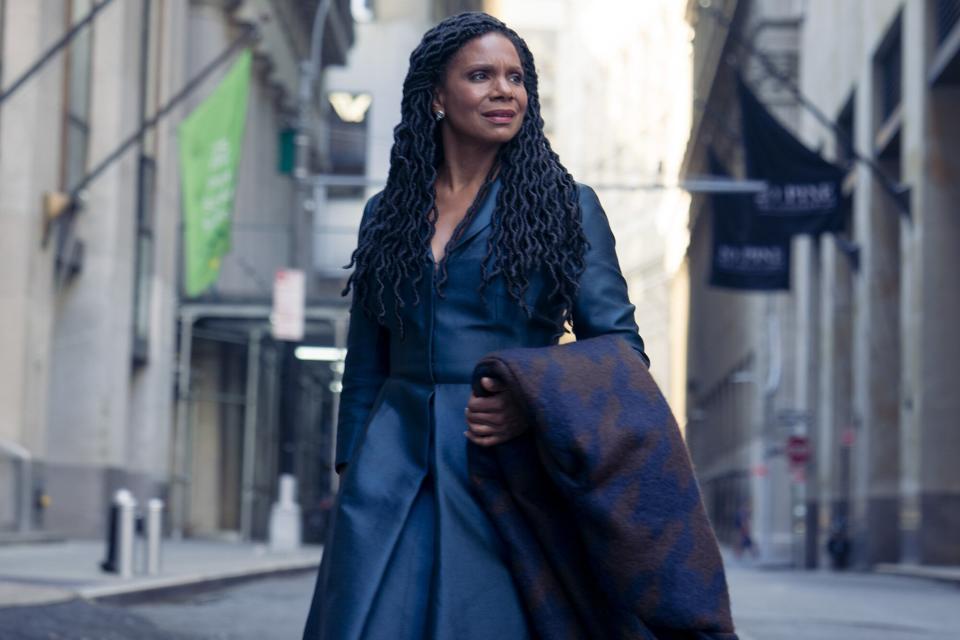The Good Fight review: This is how you (begin to) end a TV show

- Oops!Something went wrong.Please try again later.
- Oops!Something went wrong.Please try again later.
Do you ever worry someone you don't know will walk up to you in public to shoot you in the face? Or worse, they'll make you the clueless subject of an internet prank? There must be a few Americans left who don't agonize all day about massacres, identity theft, society's breakdown, systemic oppression, climate catastrophe, or catfishing. For the rest of us, there's The Good Fight, the hysterical Paramount+ drama about lawyers at the end of history.
In the cheerfully unsettling sixth season (premiering today), people eventually just stop noticing all the explosions. Bangs keep echoing outside the windows of Reddick & Associates. It's from the protests, or maybe it's a car bomb, tear gas, gun shots, who knows? Attorneys conduct business, juggling office politics with legal tomfoolery. But threats are everywhere. So how nice to see the calm moment when multiple beloved characters ride down an elevator together. It's how a TV episode should wrap up, that giggle among coworkers, jobs well done till the same time next week. And then a grenade lands at their feet.

Elizabeth Fisher/Paramount+ Christine Baranski and Audra McDonald on 'The Good Fight'
There are still cases, of course. Liz Reddick (Audra McDonald) and Diane Lockhart (Christine Baranski) argue assault isn't assault when it happens in the metaverse. BOOM! Marissa (Sarah Steele) is a real lawyer now, which means she can defend a pop star's decision to cancel a show in problematic Israel while touring through problematic China. CRASH!!! Kingpin-defending Carmen (Charmaine Bingwa) has a new client into way more more evil stuff: Cryptocurrency. KABLAM!!!!! Male corporate overlords insist Liz hire a new male partner, Ri'Chard Lane (Andre Braugher), a god-proclaiming showboat. Ker-SMASH!!!!!!! And political fixer Eli Gold (Alan Cumming) returns from the Good Wife just in time for "Democratic Watergate." KRAKAPAFWOOM!!!!!!!!!!!!
Really, what is going on outside? The particulars are hazy: truckers, Antifa, a militia, white supremacists? Recent history fills in the gaps. Roe v. Wade. Russia. A whole political party running against voting. We are either approaching or living through a new Cold War and a new Civil War — or maybe Diane just needs to stop doomscrolling? Good Fight has always mined drama and comedy from Baranski's good-humored weariness, the special way she can make confusion look like a power move. In a moment of renewed stress, Diane seeks wellness from Dr. Lyle Bettancourt (John Slattery). He offers a kind of ketamine therapy. Diane already spent most of season 2 consuming small drips of LSD, but the good doctor promises she'll gain new insight with him as a guide. "To just microdose," he swears, "Is to be Dante without a Virgil." Remember, Dante met Virgil in Hell.
Diane's mood improves. She smiles that splendid Baranski smile and laughs that tremendous Baranski laugh. Is this brilliant lawyer receiving new insight — or losing sight of the Inferno around her? Maybe serenity requires delusion. In the premiere, VR goggles reveal that the fake universe is way more fun than what's left out here. Out here are concentration camps, lame documentaries, idiotic judges, and freaking Nazis. Out here, an unknown force threatens the law firm with a devastating event on November 10th (coincidentally the very date Good Fight will end.) Out here, Liz keeps getting strange phone calls from UNKNOWN. Out here, no joke, they're suing a fetus.
Safe to say, I think, that Good Fight is officially the weirdest normal show ever. Co-creators Robert and Michelle King never lost this spinoff's fundamental network-procedural DNA. Every episode embeds familiar signifiers: Clockwork courtroom scenes, guest-star judges, devastating cross-examinations. Stories are ongoing, yet not always serialized. Constant cast rotation suggests the opposite of a five-season plan. It's possible all the young Euphoriacs no longer carry any deep memory of regular weekly TV. But that feeling of old order lets The Good Fight dramatize genuine chaos better than almost any TV show of our chaotic era. You expect murder on a post-apocalyptic series. Here's a series full of people who have watched plenty of post-apocalypses and worry there's one happening, like, tomorrow. That constant feeling of rupture gave Good Fight its jolt, and made a lot of wannabe-deep recent shows seem intellectually bankrupt, even cowardly, by comparison. We're lousy with lame dystopias and historical miniseries scoring decades-later points. You went to Good Fight to watch headlines rip into flaming confetti.

Elizabeth Fisher/Paramount+ Audra McDonald on 'The Good Fight'
In the five new episodes released to critics, three moments genuinely stunned me: Serious, mouth-on-the-ground, where-did-that-come-from shock. There's also a quiet sequence that will haunt my nightmares. Liz goes on a news show to discuss the Supreme Court. She's happy about Ketanji Brown Jackson, upset about Clarence Thomas' wife: Welcome to the mind of an average Democrat. A cameraman on the show's set makes a gun gesture at Liz — and silently pulls his finger trigger. Jesus Christ.
Christ was, you may recall, a recurring character last year, thanks to some COVID hallucinations that tormented the firm's investigator Jay (the wonderfully subdued Nyambi Nyambi, forever the cool breeze in Good Fight's hot days). And that was possibly season 5's least loopy running plot. The Kings have managed a few wild tricks with Good Fight, maintaining droll ensemble charm while satirizing all sides of political doctrine and conventional pop culture wisdom. I think season 2 remains the best portrait of the slippery paranoia and turbulent exhaustion of the early Trump Era — while season 3 was a defining work of liberal-based #Resistance skepticism, imagining a sincere feminist counter-revolution that embraces the enemy's tactics and losing its soul. The show's politics were either protean or static in a changing world. It was explicitly anti-Trump voter, remains very pro-punching Nazis, but now also seems baffled by progressives. (Diane identifies as the latter, though the show isn't afraid to suggest her profound anxieties are symptoms of rich-white-lady privilege). All along came the musical numbers, a surprise pregnancy, revelations of misconduct, much fretting about billable hours, and lightning balls. Plus Gary Cole as Diane's incongruously gun-toting Republican husband; man, they put the sex in sexagenarian!
The last couple years had brilliant standalones and centered the Diane-Liz relationship, giving more attention to McDonald's charismatic frustration, which can turn on a dime from hilarious to heartbreaking. (The McDonald eye-roll plus the Baranski laugh equals pure television.) Seasons 4 and 5 also edged deeper into outright absurdity, and could shed any pretense at character drama for scenes that sounded like directly-transcribed writers' room arguments. Was the show keeping up with reality's traffic? Looming doom gives the new season more of a compass, I think, despite some awkward early steps. Carmen's dalliance with crypto feels vague. You want a Good Fight case to become a dizzying 10-ring circus, where different arguments turn your own opinion sideways. Here, crypto just seems weird and monstrous: Accurate, maybe, and not very specific. Diane's return to psychedelia really does feel repetitive, even if the dialogue works hard to convince you "déjà vu" is a whole theme. Braugher's gleeful swagger is welcome anywhere, but Ri'Chard is such an all-caps CHARACTER that it takes a few episodes for everyone else to stop gawping at him.
I can't shake the feeling this season is leaving me with, though. It's never been more of a genuine thriller, even if the tension is mainly lingering. You fear any casual conversation could take a violent turn. Ever-confident Marissa finds herself shaken, worried that she's become targeted by an anti-semite militia. The streets of Chicago seem overpopulated with multiple shadow societies, some noble, some monstrous, all inscrutable. There are still occasional joys, even some ambient chat about the greatness of Below Deck Sailing Yacht. But some kind of end is near. "Feels like bad times," Carmen says at one point. It'll be worse when Good is gone. Grade: B+
Related content:

